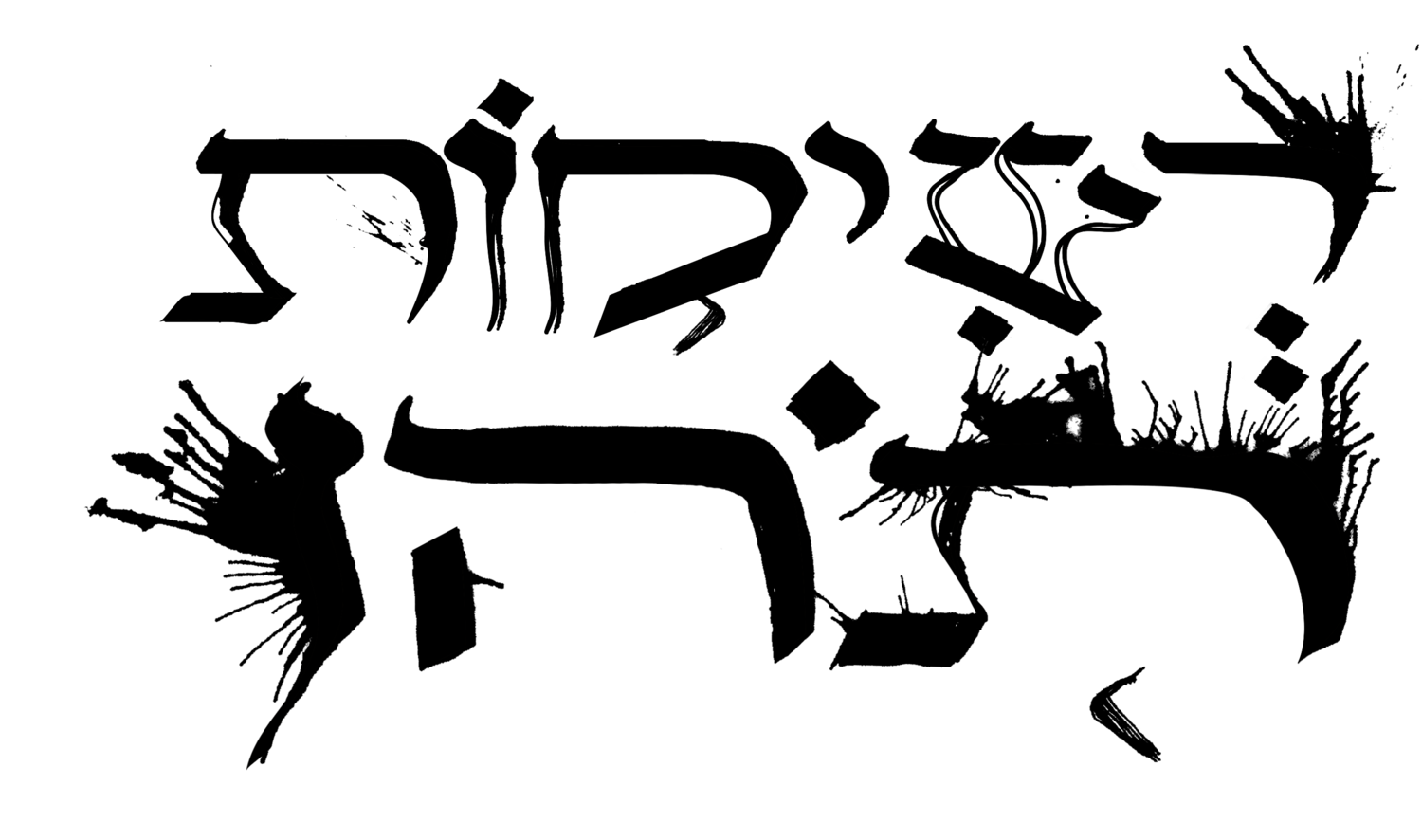Tales from The Frontier – Part 2
Tales from The Frontier – Part 2 >English
רְשִׁימ֥וֹת־תֹּ֖הוּ | An Interview with Diego Matejka >ATMF Records
By: Noa Artzi
10-12-18
The intense correspondence with Diego Matejka continues. This time we delved into a deep conversation on a myriad of topics, ranging from musical gamechangers and the current state of our art and the underground, to Absentia Lunae, the initiative in which, among other talented minds, my interviewee Diego Matejka is creatively involved.
This initiative, as an embodiment of the words spoken so far by our respectable interviewee, exceeds the scope of a mere musical project and invites the listener to reexamine his being in this world, in these times. To some seekers, their offering may be akin to a lush oasis amid what seems to be a spiritual and some would say, a cultural desert.
The path of Burzum and the spiritual quest of Black Metal
5. In “who’s afraid of the wolf” you have also expressed your strong support of what you have called "the Burzum path". What do you perceive as this path’s characteristics and what is its significance to ATMF’s vision and to Black Metal in general?
If we look at Varg Vikernes’s recent Youtube activity, I deem we should close the answer there, but indeed the influence he had to some extent in the 90’s in forging the conceptual evolution of Black Metal cannot be denied.
I was a huge fan of all first 4 Burzum works, moving from the demos to Det Some Engang Var, Hvis Lyset Tar Oss, until the masterpiece Filosofem. That was a journey to a new dimension. On all those albums I see something moving towards a transcendent target. I don’t know how much of this was done consciously, but this guy was forging a new way to make extreme metal music, going beyond those borders, moving in the sub-audible and crushing the wall of the usual Metal mentality.
I never thought of myself as the typical metal-head, just listening to different kinds of Metal, asking himself if it was Metal enough. I have nothing against them but my expectations were far better. Maybe I faced a lot of disillusions during this Journey but it’s part of the game and I deem all bands dealing with ancient cults and mythology were at that time something to further investigate or to follow up more closely.
Hvis Lyset Tarr Oss was a sort of “Alea iacta est[1]” step to a wider dimension, the raw coldness of the guitars melted on a visionary and expansive projection of our soul. “Filosofem” has changed so much in the scene, bringing back the significance in the connection between the primeval wrath and the sources of knowledge of our European tradition, our spiritual heritage.
Of course, someone could mention Enslaved too and there are grounds for that, but there was a hateful projection on our daily life in the Burzum experience that made it even more “real” and powerful.
The scene has changed quite a lot at that time, and although we never got any direct influence with Absentia Lunae for example, where references were others, a lot of this connection manifested itself in ATMF/DTP/SSS releases over the years.
6. Would you say there’s a certain aspect of “riding the tiger” in all this, i.e. in using a "modernist" artistic medium which originally emerged as an expression of dead-end nihilism to initiate a spiritual quest?
This is of course an abused topic within some clans. We’re there of course and the fact that we don’t live like Spartans, many times doing some less remarkable things, may draw some people to associate some behaviors to the Evolian “ride the tiger[2]” motto.
I simply don’t relate to such topics and believe this is of course a very trendy way to enjoy life. I believe we can’t be way better than the age we’re living in but I don’t need to follow this specific topic to feel better or to grant philosophical support to decadence.
I can of course live with decadence, but I won’t stop perceiving the same as it is, as “a decadence”. Of course, this habit means to be in control, differently. I see control & loss of control both as interesting underlying themes in Black Metal, they may sound the opposite but are part of the liberation & personal improvement process. So, no, I deem to be quite far from this way of living.
The underground
7. In the age of dead gods and ideals, what is the importance of a strong underground and what can potentially serve as its stable foundations? What role can ATMF strive to serve to create a stronger, healthier underground?
We cannot be fully healthy, must say, but at least we can try to get something more from the distorted challenges we’re trying to impose on our daily life. I say distorted because we’re making many references to our vision of a certain age of mythological no-time, a far vision which we usually enrich with our understanding and our expectations.
Most probably we get what we are. There’s a philosophical point of reference that states “we that elect ourselves to be god” and in some way we must agree on this point. I deem ancient mythology shouldn’t dwell too far on the mystic side but perhaps should represent the will of the humans or better of a clan, a population like the German tradition was showing. The point is that the meaning of this religion was also applicable to the most evolved form of human being.
I love the pragmatism of the Roman way of understanding and manipulating mythological mysticism to a practical target. Depending of your awareness, this can lead of course to a slow process of these sources of inspiration becoming arid, but we don’t run the risk, I guess….
8. Your article on “Operation FUBAR” from 2012 paints, with its bitter sense of humor a truly pessimistic picture on the future state of our art. As someone both involved in music production and journalism, I laughed and cried bitterly while reading this, remembering all these moments of despair which tend to emerge while contemplating our place in this world. 6 years later, has anything changed in our front? Any luck in the trenches? Do you see a different course of action in the face of these adversities?
At that time, we were really, really scared about the way things were developing. The bitter taste of this age of disillusion is still a part of my personal experience in this field.
I look around on the human herd and I see the exact confused attitude. Most of them take everything for granted. Most of them think they deserve to have everything without the obligation to give something in return. Being doesn't mean right to live. From my point of view, you own nothing. Everything has to be protected, raised, developed as an expansive force. Once you miss contact with this face of reality you miss the point and become a weak creature, to feed the worms.
Speaking about the scene, year after year things are getting worse, less people, the new ones simply don’t relate deeply to the concept and those music freaks they call hipster, it seems they only experience Black Metal albums, or even NS stuff, like going to a cinema to watch a horror movie. It’s like they want to be scared without being fully part of it. They simply do not share the ideas behind the stuff they want to see and listen to… So yes, we’re going downhill…
[Noa Artzi:] On a personal note, I must say these words seem to further validate the concerns I have already expressed regarding the state of our art in my review of “Blackhearts”. Yet despair is our poison. In these days, a strong resistance front, as that formed around ATMF seems more vital than ever, and these words and actions should serve as a source of inspiration to any soul who still bears some faith in our art.
Absentia Lunae
9. Absentia Lunae too, is much more beyond music. It is somewhat of a Gesamtkunstwerk[3] which cannot be fully appreciated unless observed as the integrated product of music, words and visuals. How would you describe Absentia Lunae to someone who’s never heard about it – musically and beyond?
Thanks for having noticed one of the main focuses of our project. When we started AL we immediately determined that our musical creation, already having very ambitious goals deserved an equally significant visual and conceptual sharpness. Aggression and a vibe, visions of tragedies, a purifying mixture of dusk, dark shades of a bitter taste, anguish co-existing with a will to transcendence. The moon still can’t emerge from the shadow. This is Absentia Lunae.
Inspiration drawn from classical music and early 20th century art
10. I recognize influences of heroic Futurism, monumental classical art and music somehow elegantly embedded into an avant-garde, at times an industrial but always a unique strain of Black Metal. How does each of these sources of inspiration serve as a vehicle to convey Absentia Lunae’s message to the world?
I deem Serena / Climaxia would be a better source to go into detail with such a question but indeed you’re mostly right about all references mentioned. The topic of Futurism has to be clarified, also because there’s not a direct link, but more than everything because it is expressed by an aptitude to involve noise / industrial and post electro music in our creation. You can perceive it here and there in our songs, but it’s more of an idea on how to perform and create complex riffs and make the songwriting more personal, not merely related to Black Metal. We’re not simply creating post Black Metal. The guitar riffs have something that goes beyond those artistic boundaries. Personally, I was stunned when Mayhem took the daring path of making modern Black Metal, with a killer avant-garde-ish artistic direction.
Still, from my point of view DHG / Mayhem are key references.
11. I’ve noticed that monuments or visual manifestations of an ideal seem to be a reoccurring theme in your works. I can totally relate to this, after being awestruck by the war monument by Lago di Lecco during my first visit to north Italy – which I’ve also mentioned in my article on Italian Futurism. What special significance do these visual manifestations hold for you and for Absentia Lunae's art?
The futurism related theme is predominant on Vorwarts, but if we look into the details, there’s always a perseverance of classical elements with the dynamic strength of Futurism. Spite Extreme Wing were indeed the first to introduce the term Archeo-Futurism to the field of Black Metal and I deem this has been the most intelligent interpretation of a practicability to match these elements (of Archeo Futurism – N.A.). Black Metal, the sound coming from the woods and the stage of Nigredo, forged into a modern guise but recalling the vengeance of the past, the eternal return. To go forward to get back to the ancient truth.
The Lyrics have in fact the cohabitation of Indo-European references & modern dynamics. But more generally, I deem all past & present Absentia Lunae artwork fully represents our state of being at the precise time when we released these albums.
Our first album, “Marching Upon Forgotten Ashes” that will be soon repressed on cd takes this anguish and dramatic voice of a spirit that seeks a way out of the sewers of modernity, that died in a bunker and now raises questions and approaches its dramatic awareness from our everyday perception, by gathering all the pieces – like a continuous path of knowledge.
“In Umbrarum Imperii Gloria” manifests a glorious and forgotten golden age through the deforming black & white lens of the European kind: we can just try to perceive history but we are often influenced by our will to categorize things. This is why the European kind has its own understanding of history and past facts. We’re still living these human forms and we have to live with it. Still, the negative vibe is strongly present. The full weight of the lost glory and the bitter taste of tragedy have a prevalent role in the evolution of the album.
This obscure and Ossianic[4] strength is driven to an extreme catharsis on “Historia Nobis Assentietur” that drives our music to even more extreme territories. The artwork is perfectly in line with that state of our spirit.
Modern warfare and the metaphysics of war as sources of inspiration
12. Absentia Lunae can be characterized by its harsh sound and striking visuals which resemble old-school political propaganda and military aesthetics. It is all combined with lyrics that somehow deal with all this, but from a very symbolic perspective. It brings to mind concepts related to the metaphysics of war. Was this the original intention behind your art?
In modern European countries we’re missing contact with the basic meaning of every living being’s daily quest. This causes people to get addicted and to deform every kind of personal interest to a sort of pathology. The extreme topic, dealing with the connection between the soldier and his duties towards his family and country, even reaching transcendental projections of this experience was obviously a core topic for us. I do of course love peaceful naturalistic places and sometimes feel the urge to plan some free time in those wonderful environments, but I deem that life has to be a balance between these sides of a healthy human being. This is why, for example, I stay away from the masses but I still love to join my dojo for some practice and fighting. We must never become tools of the predominant fear of the many weak fellows that surround us. They would like to have anything pacified to feel sufficiently relaxed, but this is of course an illusion. In our equilibrium there are always creative & destructive forces in interaction and forever shall be.
13. There is an undeniable mutual relationship between art and war, particularly in Black Metal. What is the significance of this relationship to Absentia Lunae's art?
There has been a part of it in every Absentia Lunae artwork. Wherever a dead demon of war lies, like on the rotten bunker of our debut, or in the photos we took at Fort Hensel near Tarvisio, a place where Italian & Austrian soldiers struggled. “Historia Nobis…” has a full reference, a sense of liberation through tragedy, like a pustule exploding and dispersing its mess everywhere. Vorwarts is more related to a dynamic and aesthetic manifestation of this topic. We live under the banner of mythological vision. Of course, this scenario is part of us, but distorted by our everyday social lives. We can perceive a glimpse of the purest truth, but not fully get it.
14. I understand you also practice far Eastern martial arts. Is it somehow related to your interest in the metaphysical aspect of war? What is your personal perspective on the importance of metaphysical knowledge in combat?
Nowadays we see a predominance of self-defense courses. They want you to believe that you’ll be able to handle the mess once needed, but most of the time the people experiencing them don’t have any clue of what pain might be. They don’t take martial arts to a practical application. You have to feel the pain to get the full picture.
Of course if you do have a chance to practice on a military environment you come to the point where you experience the pain involved in actual face-to-face combat.
Of course, it is better to put yourself in a mindset of self-defense, as opposed to the “nerd doing nothing” mentality.
But I believe that giving and handling pain and improving discipline are more important, far more. This is why on my daily life I’m experiencing this art of full contact karate that developed from the corresponding traditional style, which is more inefficient.
Traditional karate has faced many developments through the ages. At the very beginning it was meant to be really useful, since it was constantly applied in a practical manner. After the 2nd world war, the Japanese were forced to submit the tradition to the sport environment, because the traditional use of this art was forbidden.
Therefore, karate became something which is too much related to a sportive activity than to a tool of practical efficiency. Full contact karate tries to take it back to the primordial truth. Kyokushinkai karate is also welcome. The "traditional" karate, what we call karate Shotokan, the one I experienced when I was young was like this, formally exemplary but not too efficient. The most decadent example of this art is to be recognized at the karate competition, where it has become like some kind of fencing tournament, trying to get points instead of seeking for something true and efficient.
There is of course all the metaphor of war flowing in the background, you got it.
[Noa Artzi:] Yes, I can understand. I actually grew up in Japan, so I have a certain affinity towards this country's traditional culture. Still, I have noticed that many Japanese people turned their backs to the deeper aspects of their tradition and spirituality following the war. Seems like the fate of Karate in Japan after WW2 was no different.
15. One can face many hurdles while attempting to acquire any sort of true metaphysical knowledge in the Kali Yuga. How would you advise one who wishes to overcome these?
Like I mentioned before, everything starts from having more time to relate to yourself. Do your utmost effort not to become an out-of-control instrument of the materialistic society. Make reference to the most natural needs and then try to grow your personal goals, step by step. There’s no winning formula, you simply have to listen for this call to move on this apparently uneven path.
16. The lyrics of “Memneso on” brings to mind a thousand and one things… It seems to reflect the highly relevant crisis of man in a world where god is dead and its dead-ended nihilistic aftermath… But I’ll let you do the talking. Tell me about the ideas behind this epic piece.
I deem that most people understand this reference in a different way than we do. I understand it as the death of the Christian connection with god, not the connection with a supernatural perception of our destiny. The silence is the key topic in amplifying this distance, but we go back to the primordial age, starting back from the silence and opening the womb to the return of the natural forces. What is dying there is the fake expectation for the Christian communication with god. But can be also perceived by the Christian retarded herd as the voice of Jesus claiming and shouting at Golgotha. Of course, it wasn’t my intention to involve this quote to fully represent the director’s ultimate message, but I found it very rich in its extensive understanding of the relationship between the human being and his supernatural meaning. We need this silence that we finally found to discover a new age, going back to the roots…
[Noa Artzi:] Yes, the peaks of the Transcendent have merely been hidden behind a cloud. Christianity has exhausted this link, merely through its own perception. Utilizing the silence hereby born as a chance to contemplate and reestablish the link with an absolute reality is a great way to “ride the tiger”. This is a brilliant example of how Black Metal can invite you to do that…
17. Any concluding words to our readers?
Aspire to do more in your daily life. We’re doing far too many irrelevant things, but to take a higher view of things is the key to grow more conscious and confident. We’re everything but mostly nothing, anyway we’re a part to play now, so why be ahead of our course of time? We haven’t yet become a pure spiritual form. We still have challenges to face, blood, sweat and tears to be shed. Let's face it at our best instead of just giving a superior meaning to any small part of it and becoming an instrument of this spiritual game. Let's pass through this dimension called life without becoming a guru but by being more modest. We still need those symbols.
*
[1] “the die is cast” in Latin, meaning that events have passed a point of no return - a critical turn of events.
[2] Julius Evola’s final major work, which examines the prototype of the human being who can give absolute meaning to his or her life in a world of dissolution (1st published in 1961).
[3] From German – translates as "total/ ideal/universal work of art" or as a "synthesis of the arts". Mainly meaning an artwork that makes use of all or many art forms or strives to do so (Wikipedia).
[4] Osian or Ossian was regarded in legend as the greatest poet of Ireland, and is a warrior of the fianna in the Ossianic or Fenian Cycle of Irish mythology. He is the son of Fionn mac Cumhaill and of Sadhbh (daughter of Bodb Dearg), and is the narrator of much of the cycle (Wikipedia).

ATMF
Frontiera dell’Essere - "The Frontier of the Being"
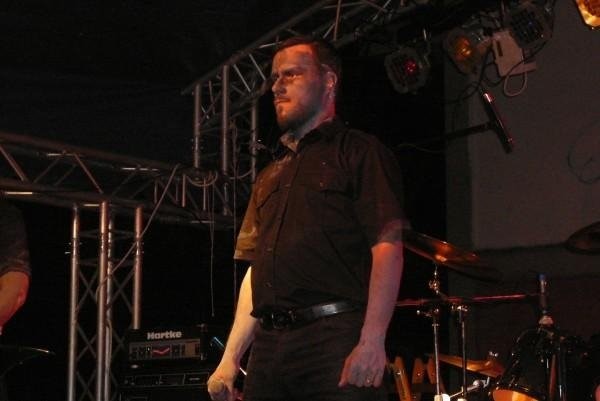
Diego Matejka with Absentia Lunae
"Maybe I faced a lot of disillusions during this Journey but it’s part of the game"
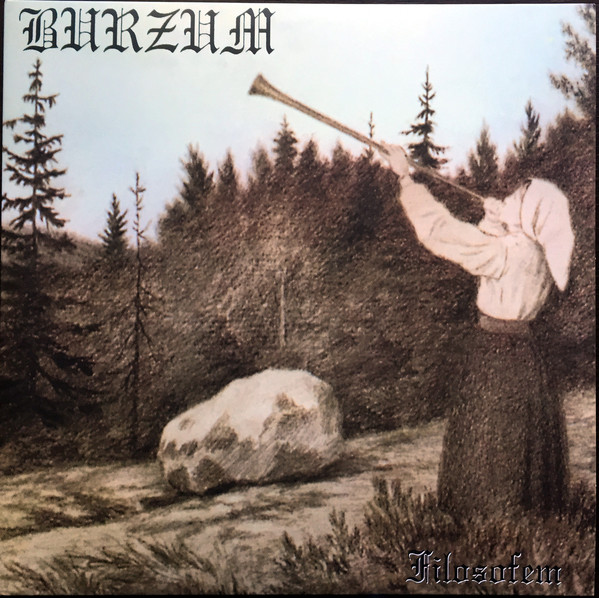
Filosofem
"The 1st 4 Burzum works, moving from the demos to Det Some Engang Var, Hvis Lyset Tar Oss, until the masterpiece Filosofem. That was a journey to a new dimension"
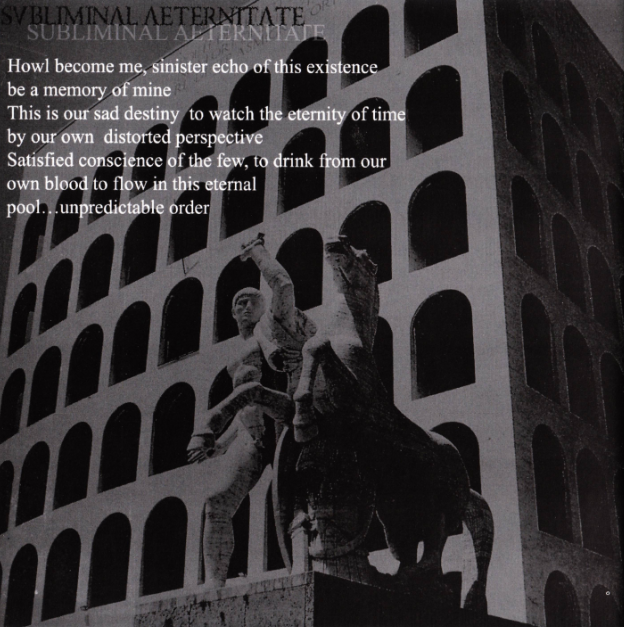
Arechofuturism
from the booklet of "In Vmbrarvm Imperii Gloria (2006)"

Absentia Lunae
Vorwarts
(opening picture from Spirit of Metal site)
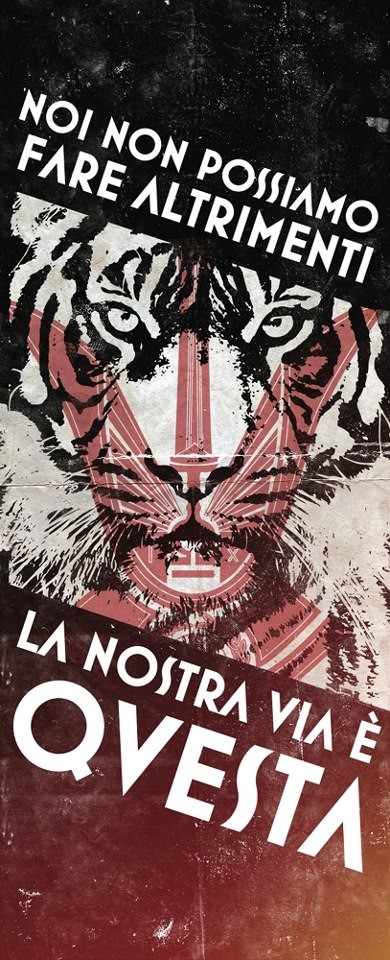
Striking album artwork from Vorwarts
The caption reads: "we cannot do otherwise, this is our way"

Absentia Lunae - Live
March - 2011 (from the Bands Facebook Page)
